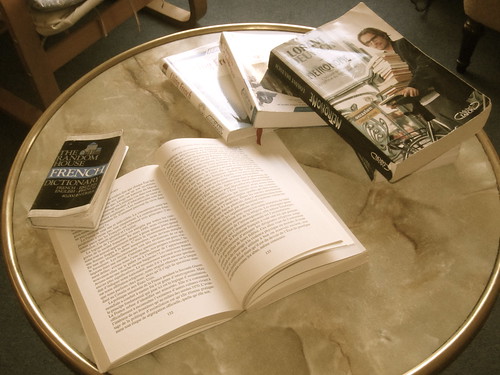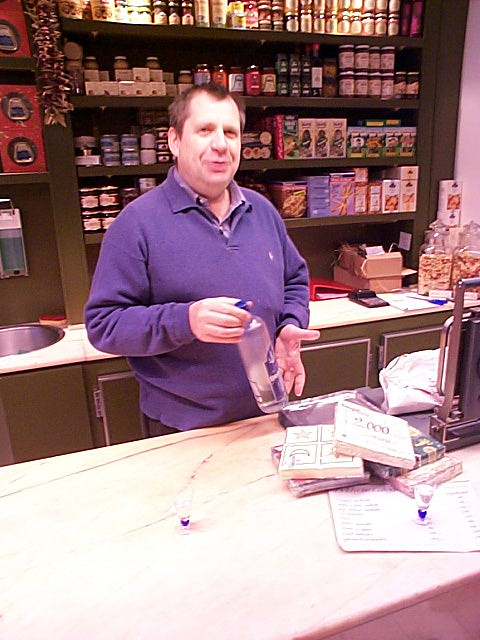What is Fluency?
Everyone seems to have a different definition of ‘fluent’ and ‘fluency’. I remember hearing a grown man tell me that his friend went to Sweden and was fluent in Swedish in three weeks, with no prior experience with the language. Then again, the man who told me this never learned a foreign language and had never really travelled abroad.
In the United States, the bar seems to be set a little lower for quantifies ‘fluent’. I’ve heard people tell me that they were fluent in a language, yet couldn’t order dinner without the waiter switching to English. Perhaps it is because we have so little exposure to foreign languages that anyone that speaks a few words in something other than English can be considered a fluent speaker of the language.
Conversely, one must have a high level of command of a second language to consider themselves fluent in Europe. A high proportion of native Parisian students would be considered fluent in English if they were judged by the same standards as those used in the United States. However, if you were to ask them if they are fluent or not, many would decline and say that they do speak it well enough.
This leads to the question: What is fluency? What constitutes the progression to fluency?
Exposure – While I’m sure it is possible to become a fluent speaker of a language with limited exposure, it is very difficult. If you want to speak a language well, you have to be around it. Speaking for five minutes a day in your high school classroom just isn’t enough.
I had this naïve belief before I moved to Paris that based on my six years of middle and high school French, that I would probably be fluent within six months of living in Paris. I had studied here for a month in university, and I felt pretty comfortable with my French while I was here. However, there were a couple of things that I didn’t take into account:
Firstly, I was spending most of my time with American students, and we weren’t speaking in French to one another.
Secondly, since I wasn’t passing time with the French, my only real exposure was in restaurants, ordering food. I was a pro at getting dinner but I couldn’t contribute much to a real conversation. I remember someone asking me where the post office was and I was able to tell them that I didn’t know. I was proud of that moment up until two years later, when I moved back to France.
Upon arrival, I realized I was nowhere near fluent. I made friends with some French kids, and this is where I made some progress. At first, I just listened to the conversations.
Image credit ‘clared23’ on flickr.I couldn’t contribute anything meaningful, so I just concentrated on understanding the dialogue. I would concentrate so hard that I occasionally fell asleep at the table (not as a result of alcohol, surprisingly). It was here that I started picking up useful words and expressions like ‘truc‘, ‘machin‘, ‘mec‘, ‘en fait‘, etc. I would look these up and then try to use them in the conversations I attempted to have with my girlfriend.
After about three months of living in France, I actually felt like my French was worse. It was better, but only at this point I began to realize how often I made mistakes.
On a side note, from time to time I started having dreams in French. This is no indication that I was fluent, as at this point I was far from it. I feel this is misconceived as a sign that one has a command in the language. Almost every dream I had in French at this time involved me buying a croissant, or asking what time it was, or telling my mom to put away the dinner plates.
Speaking – One cannot have a command of a language without being able to speak it, right? I attempted to speak French as often as possible. The biggest help was that I started dating a French girl a few weeks after moving here. Instead of me going to my French classes, I would come over to her apartment and attempt to speak nothing but French for two hours, two to three days a week. It was incredibly frustrating and exhausting at first, but within a few weeks I saw some improvement. Here’s how I gauged that my French was getting better:
At first, when I came into a shop, I would ask for something and the vendor would respond in English. From thereon, the conversation was in English.
After a while, when I came into a shop, I would ask for something and the vendor would still respond in English. However, I would respond in French, and then we would continue butchering the other’s language until one of us gave up. At first I would give up. A couple months later, they would give up.
Three or four months after moving here, when I came into a shop, I would ask for something and the vendor would respond in French.
Image credit ‘TalkingTree’ on flickr.Making Progress – I knew that my French was improving when two thoughts occurred to me:
Firstly, I no longer had to mentally translate my sentences word for word from English to French before I spoke. French and English sentences do not always have the same structure, so until you start thinking in French, it can be very difficult to have a fluid conversation in French.
Secondly, and perhaps most importantly, I no longer cared if I made mistakes in speaking or writing French. I make mistakes in English all the time (hopefully they have been edited out before you read this), and it is my native language. How can I expect myself to speak French perfectly if I don’t speak and write perfectly in English?
From here, the learning process becomes much more smooth. One might not notice the progress as much as they did previously, but those around them, especially those they only see every now and then, will be able to tell the difference.
Fluency – I think it took a couple of years before I could consider myself fluent in French. How could I tell? The telltale sign for me was that when my girlfriend and I had conversations, we couldn’t remember in which language we had been speaking. The languages begin to blur together. We could be equally comfortable speaking English or French. Though we both have much work to do before we could be considered native speakers in the other’s language, and though we still both make mistakes, it doesn’t really inhibit the conversation, nor is it as mentally draining as it was in the past.
I would love to hear other’s experiences with this. As I said, seemingly everyone has a different definition of what constitutes fluency. What is yours?










Fluency or, rather, “proficiency” has been very thoroughly defined by ACTFL (American Council on the Teaching of Foreign Languages.) The ACTFL Proficiency Guidelines describe various levels of proficiency in a foreign language, ranging from “beginner low” to “advanced high” (which is the level of an educated native speaker of that language. To gauge one’s proficiency level, one can take the Oral Proficiency Interview (OPI), which can only be administered by people who have been trained and tested on how to do this accurately.
I really liked you piece, though. Great insights on fluency!
That’s really interesting!!! I am french and I learnt english at school for so many years but I wasn’t able to speak it. Year after year, I’ve travelled a lot improving my english skills and thought I spoke it fluently. The thing is : I can understand anything native speakers say. I can make sentences (with some mistakes 🙁 unfortunately!!) and I can read it. Can I call it fluent? I dunno. Maybe it is enough to communicate and meet people. I can debate and give some of my ideas. But I am not as comfortable as in french, for sure. And my accent is still strong! Maybe, there’s a difference between speaking a language fluently and being bilingual. Maybe, that’s the difference. Fluent means you are able to communicate in your daily life and you do not have any problem to understand what people say. Beign bilingual means you speak it as good as you mother tongue.
Jean-Paul thanks for this article. I’m still sstruggling with my french language skills and even though I am FAR from fluent, it is a topic that I think about often. My challenge at the moment is the gap between the structured language courses and meaningful normal conversation, which I would still describe as pre-fleunt. Immersion in France is the solution to my dilema and would perhaps move me a little closer to ‘advanced conversation’ then ‘fluency’. However to be bilingual must be an extroardinary experience! Judy